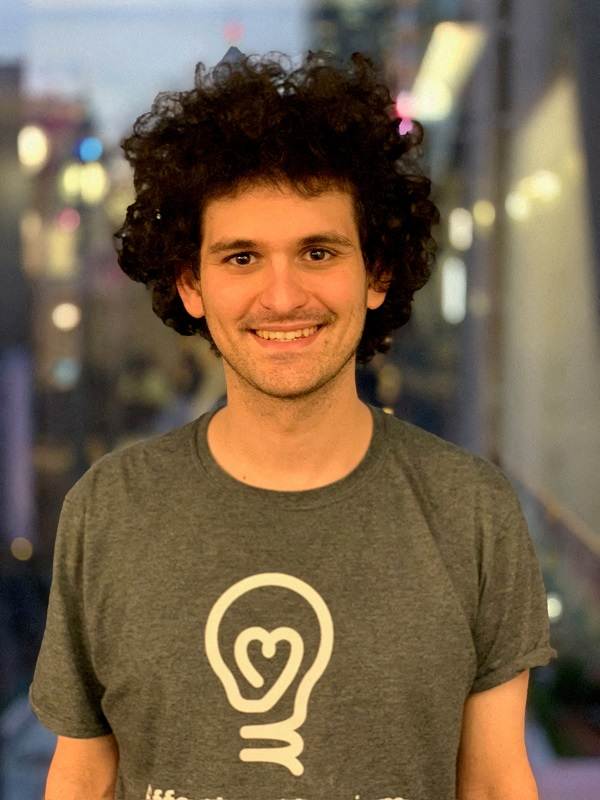
FTX founder Sam Bankman-Fried poses for a picture, in an unspecified location, in this undated handout picture, obtained by Reuters on July 5, 2022.
11:55 JST, November 19, 2022
(Reuters) – FTX founder Sam Bankman-Fried, facing mounting legal challenges over the collapse of his cryptocurrency exchange, may have harmed his defense by speaking publicly in recent days, legal experts said.
Bankman-Fried has sought to explain the implosion of FTX and disparaged government regulators in posts on Twitter and conversations with reporters. Attorneys said such statements will likely make life more difficult for the defense lawyers seeking to manage fallout from the exchange’s demise and navigate multiple federal investigations.
“There’s this old saying that a lawyer who represents himself has a fool for a client. The reverse is also true. An individual who is the subject of an investigation and tries to defend themselves in the court of public opinion has a fool for a lawyer,” said Justin Danilewitz, a white-collar defense lawyer at law firm Saul Ewing Arnstein & Lehr.
In a conversation with a Vox reporter published this week, Bankman-Fried blamed FTX’s collapse in part on “messy accounting,” expressed regret at his decision to file for bankruptcy and denigrated U.S. regulators in profane terms. He later said he did not intend for the conversation to be made public.
FTX is now facing investigations from the U.S. Justice Department, Securities and Exchange Commission and Commodity Futures Trading Commission, sources have told Reuters. On Tuesday, a group of crypto investors filed a class action against Bankman-Fried and others who promoted FTX.
Bankman-Fried’s statements have already been cited in FTX’s U.S. bankruptcy proceedings. The exchange’s lawyers said in court papers on Thursday that he was undermining their efforts with his “incessant and disruptive tweeting.”
He has become the latest high-profile figure to continue to speak publicly despite facing serious legal scrutiny, joining a group that has included Tesla Inc TSLA.O and Twitter CEO Elon Musk, ex-pharmaceutical executive Martin Shkreli and former U.S. President Donald Trump.
CONTROLLING THE STORY
Lawyers almost always advise clients in litigation or facing government investigations not to speak about issues related to the case. Such statements could become evidence in court and could undermine a carefully crafted defense. Social media has made it easier for clients with large public platforms to try to mount their own defense, experts said.
“The basic question is who controls the story,” said Stephen Gillers, a law professor at New York University and an expert on legal ethics. “From the lawyer’s point of view, once he or she is hired, it’s the lawyer who controls the story as far as public consumption goes.”
At least one attorney, Martin Flumenbaum of law firm Paul, Weiss, Rifkind, Wharton & Garrison, has already parted ways with Bankman-Fried, though the lawyer did not blame the 30-year-old entrepreneur’s controversial statements.
“We informed Mr. Bankman-Fried several days ago after the filing of the FTX bankruptcy that conflicts have arisen that precluded us from representing him,” Flumenbaum said in a statement to Reuters.
Flumenbaum declined to describe the conflicts. A onetime lawyer for convicted financier Michael Milken, Flumenbaum is currently defending Christian Larsen, the founder and chair of crypto payment and exchange company Ripple Labs Inc, in a high-profile lawsuit filed by the SEC. His law firm represents many other financial industry clients.
Bankman-Fried, who did not respond to questions about his legal team this week, has hired Gregory Joseph, a criminal defense lawyer at law firm Joseph Hage Aaronson in New York, and Stanford University law professor David Mills as members of his legal team, according to a report from Semafor. Both of Bankman-Fried’s parents are on the faculty of Stanford Law School.
Joseph is a former president of the American College of Trial Lawyers who has written about racketeering law and rules of evidence. Mills specializes in criminal law and white-collar crime.
Top Articles in News Services
-

Survey Shows False Election Info Perceived as True
-

Hong Kong Ex-Publisher Jimmy Lai’s Sentence Raises International Outcry as China Defends It
-

Japan’s Nikkei Stock Average Touches 58,000 as Yen, Jgbs Rally on Election Fallout (UPDATE 1)
-

Japan’s Nikkei Stock Average Falls as US-Iran Tensions Unsettle Investors (UPDATE 1)
-

Trump Names Former Federal Reserve Governor Warsh as the Next Fed Chair, Replacing Powell
JN ACCESS RANKING
-

Producer Behind Pop Group XG Arrested for Cocaine Possession
-

Japan PM Takaichi’s Cabinet Resigns en Masse
-

Japan Institute to Use Domestic Commercial Optical Lattice Clock to Set Japan Standard Time
-

Man Infected with Measles Reportedly Dined at Restaurant in Tokyo Station
-

Israeli Ambassador to Japan Speaks about Japan’s Role in the Reconstruction of Gaza




















